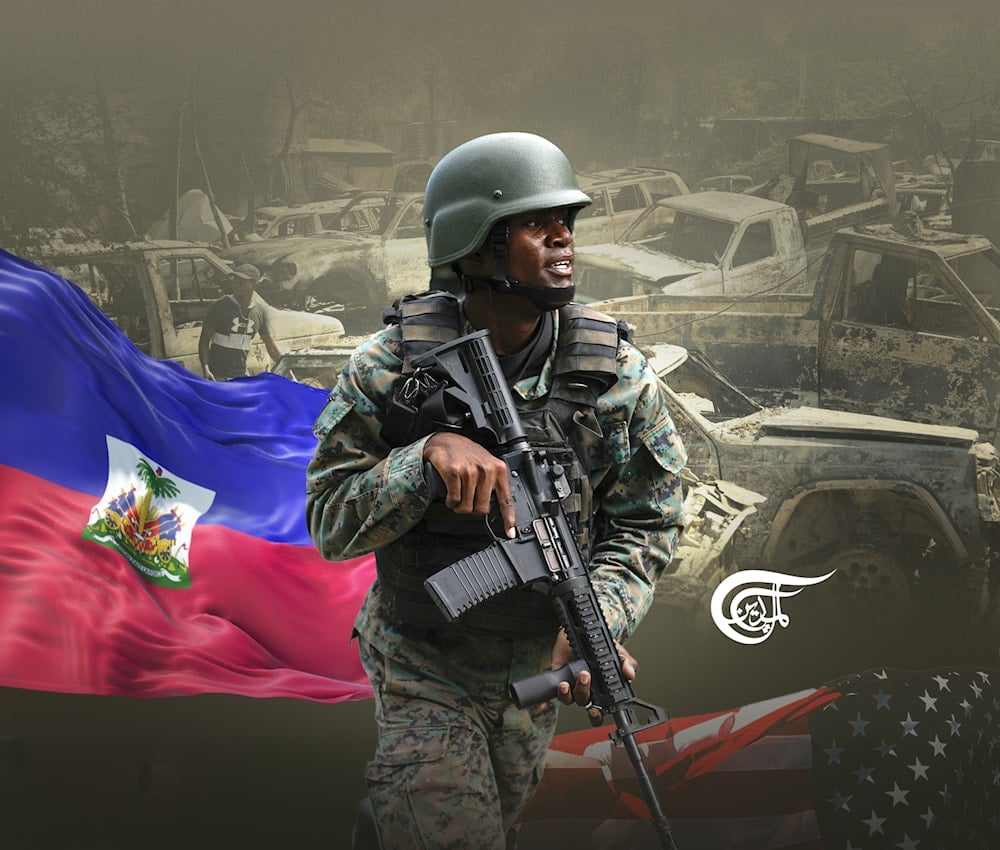US willfully escalating Haiti’s humanitarian and political crisis
Amid escalating violence, the United States appears determined to turn a blind eye to escalating factors enabled on its own watch.
-

Haitians are witness to the fact that the US military and its allies have been in their country for at least four decades (Illustrated by Mahdi Rteil to Al Mayadeen English)
Haiti is reeling from one of the worst spells of gang violence in recent memory, after heavily armed criminal gangs stormed the country's prisons, laid siege on the capital, and attempted to overthrow Haitian Prime Minister Ariel Henry.
Washington has simply watched as more than 50,000 Haitians fled Port-au-Prince, while a top United Nations human rights expert warned that the situation appears apocalyptic, "like the end of times."
Amid escalating violence, the United States appears determined to turn a blind eye to escalating factors enabled on its own watch. It refuses to play a more proactive role in restoring order, brings a history of blatant military interference in Haiti, and shows no signs of curbing illicit weapon supplies to criminal gangs.
Leave no doubt: Haitians are witness to the fact that the US military and its allies have been in their country for at least four decades, with little to show for so-called democratic progress. For years, Washington has also backed and sponsored undemocratic Haitian regimes to the detriment of its own credibility. In truth, it is yet to be held accountable for forcing Haiti's elected president, Jean-Bertrand Aristide, to flee after a coordinated US coup two decades ago.
Given the brazen extent of US meddling and intervention in the Caribbean country, Washington cannot be trusted to dial-down the risks of a total gang takeover in Haiti. In the same breath, it touts stability while justifying forced deportation of scores of Haitian civilians fleeing the gang wars.
Washington knows that the open supplies of illicit firearms to Haiti could escalate gang violence to unprecedented degrees. Thanks to its flooding of illegal weaponry, some Haitian criminal gangs have mustered greater arsenals than the Haitian National Police itself. Moreover, they have actively used these illegal firearms to fuel a surge in mass lootings and kidnappings, and even attacked sensitive state installations.
Those attacks could take on a new intensity as gangs extend their reach to strategic locations, and maintain unprecedented levels of lawlessness to the detriment of public safety.
That is an outcome that shatters the myth of so-called US ‘values’ and alleged democratic priorities in Haiti. Washington says it is committed to ensuring that Haitians resume their daily lives "free from violence and despair," but has shown no signs of trying to tangibly "restore democratic order." For years, Haiti’s own people have been denied the right to choose their own future. Not anymore.
Without long due weapons oversight, Washington risks empowering criminal groups to strengthen access to high-powered weaponry and expand de-facto control over the capital at any point in the future. For years, illicit weapon flows from the US have helped criminal gangs fuel an arms trafficking economy in Haiti that helps fund operations on the ground. The United States identifies as a top source of smuggled firearms and munitions to Haiti, making it clear that the actual source of escalation and provocation is the self-proclaimed superpower itself.
Attention must also be paid toward restoring political stability, which is hardly a priority for the US.
Washington appears reluctant to exercise most of its influence over a transitional council as it takes charge. The arrangement is key to facilitating capacity building of Haiti’s national police.
This council arrangement has been set up with the mediation of the Caribbean Community (CARICOM) bloc, but may struggle to deliver long-sought stability if Haiti's law enforcement personnel lack the capacities to screen weapons and bolster security within and around the borders.
Where is US intent to plug those capacity gaps? It only put rhetorical weight behind a UN-assisted multinational security force for Haiti, and sees the council's formation as a major step towards that goal. But without substantial US funding, increased personnel commitment and equipment support, the force doesn’t stand much chance. As Haiti reels, the US chooses to insist on more empty promises.
Not too long ago, Washington only committed about $300 million for the international police mission, an amount that doesn’t even match the extent of damage and destruction brought by US interference in Haiti over the years. Those numbers also pale in contrast to raging gang violence on the streets, which demanded up to 5,000 international police personnel in recent times.
The challenge at hand is thus serious. Many Haitian gangs previously demanded a stake in talks to establish a new government, and some would like to see prospective gang participation in Haiti's future leadership. On top of these sticky issues, the sentiment towards a US-backed multinational security force is far from favorable: Jimmy Chérizier – one of Haiti's most powerful gang leaders – warned well beforehand that any UN-assisted Kenyan forces arriving in the country would be treated as "aggressors" and "invaders."
With these constraints in mind, the lesson for the United States is simple. Stop dictating terms to a nation that is reeling from your military interventions, illicit weapon supplies, forced deportation, and wide-ranging discriminatory measures.
Tangible action is long overdue, and hollow peacebuilding rhetoric won’t cut it for Washington.

 Hannan Hussain
Hannan Hussain
 5 Min Read
5 Min Read











